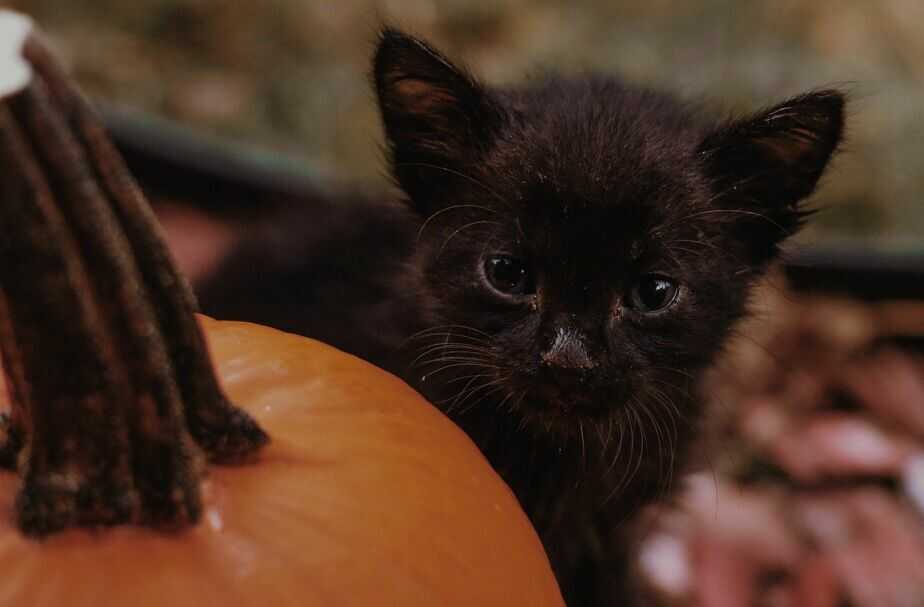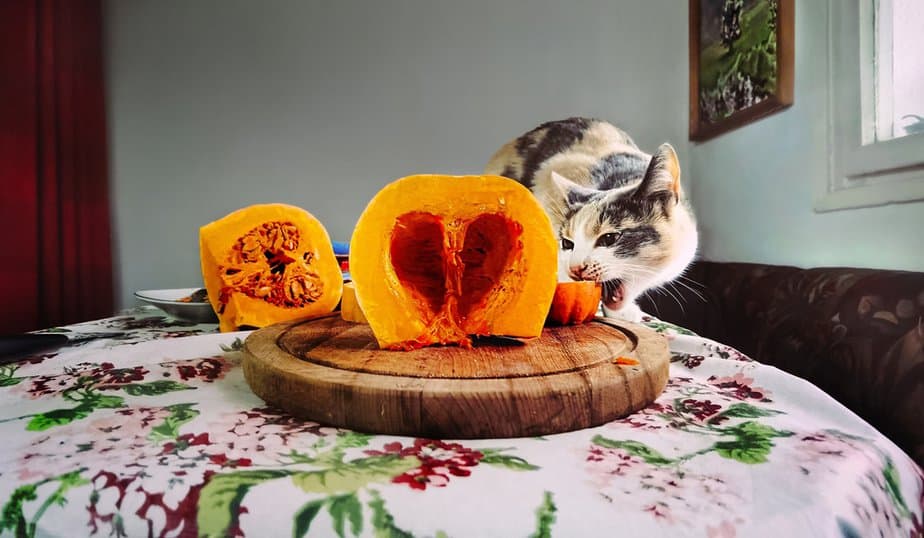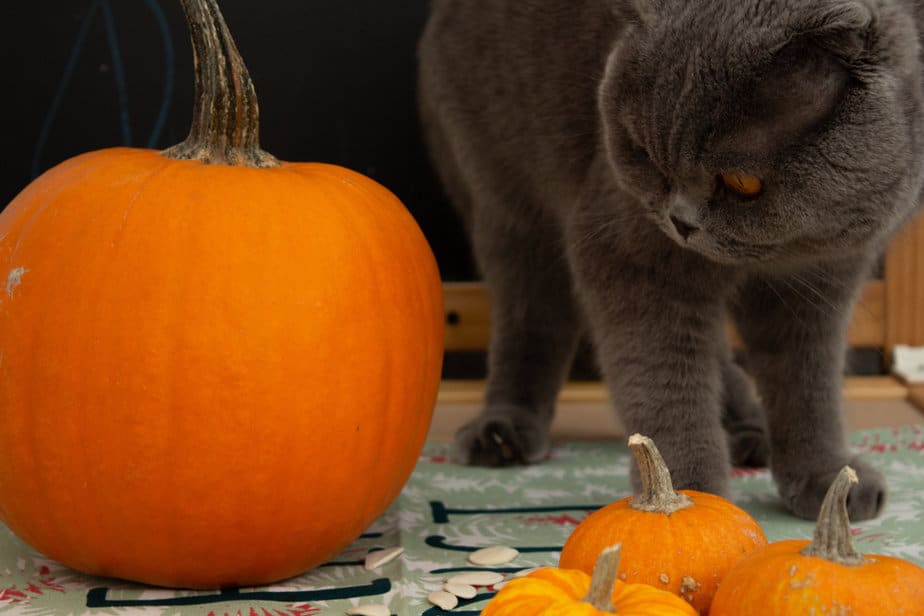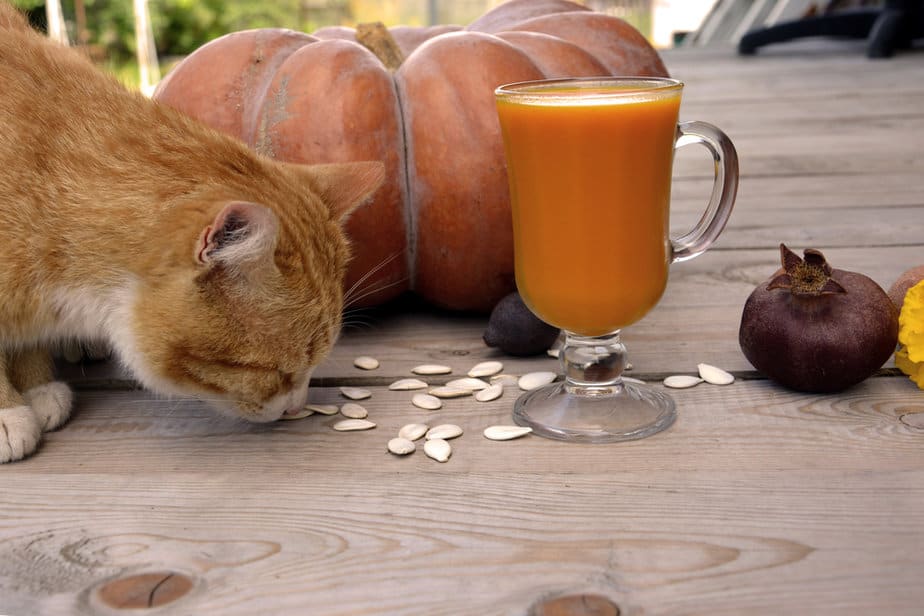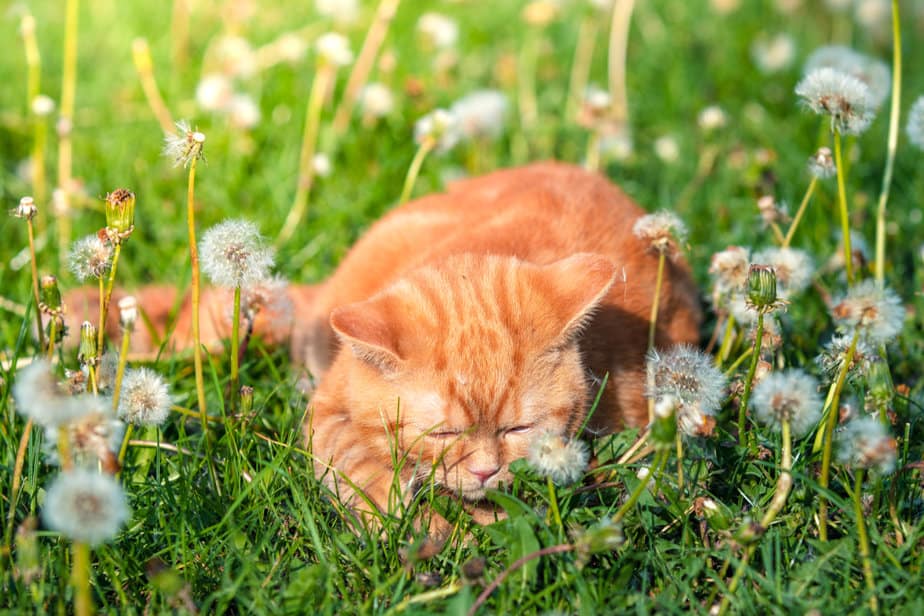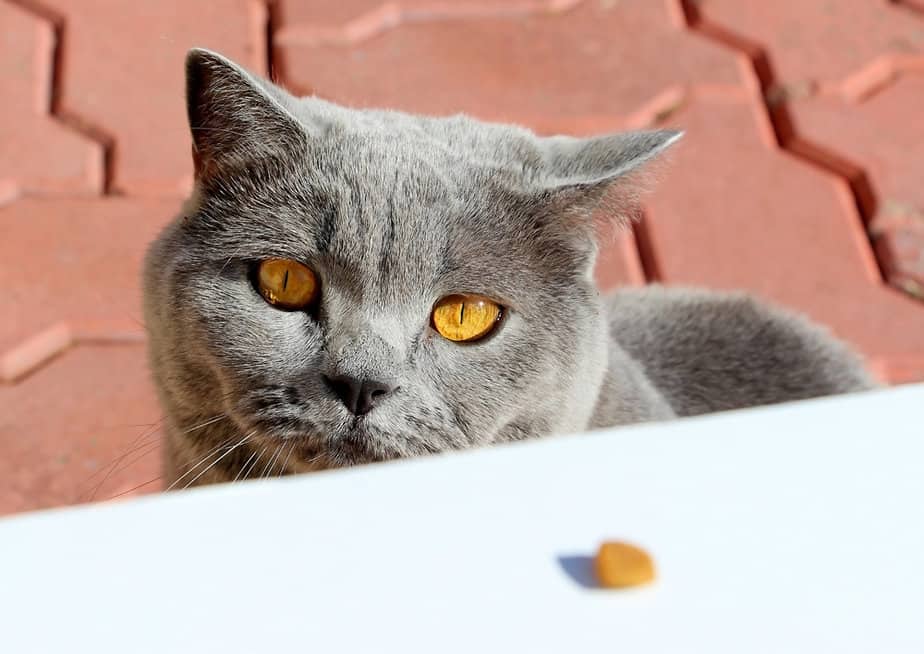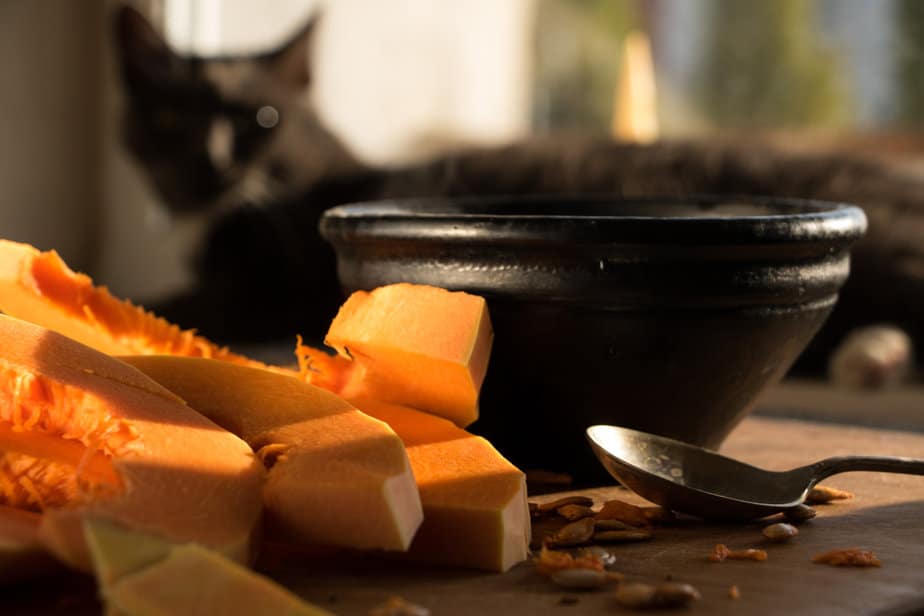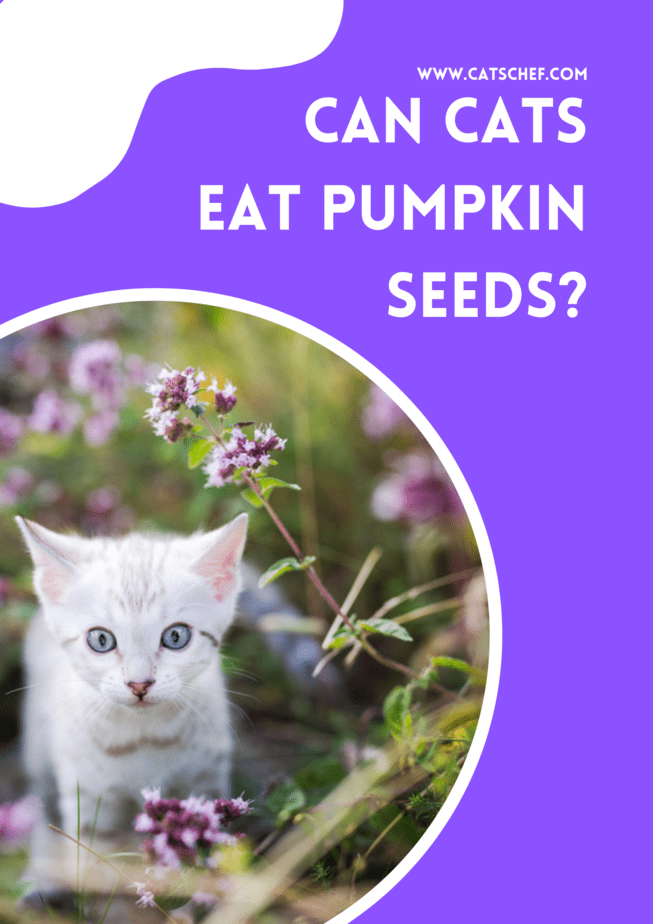📖 Table of Content:
You’re minding your own business, getting into the festive spirit for the fall holidays (hello Halloween), and snacking on some delicious snacks. Your four-legged friend appears out of thin air and gives you that “please share your food with me” look. Argh, can cats eat pumpkin seeds?
You have no idea why she would even be interested in pumpkin seeds. But, she’s a curious creature and you know better than to question her ways. She probably just got bored with her regular cat food and wants to spice things up with none other than some pumpkin spice.
But, she’s your responsibility and you can’t help but wonder… Are pumpkin seeds safe for cats? Can pumpkin seeds cause some sort of a reaction? Can cats even eat pumpkin seeds considering they’re pretty small and seem like a choking hazard?
Don’t worry, you came to the right place. According to our friends over at the ASPCA (American Society for the Prevention of Cruelty to Animals), pumpkin seeds are completely safe for your cat. They contain a bunch of vitamins, minerals, and antioxidants which makes them a great cat treat.
Actually, pumpkin seeds bring so many nutritional and health benefits to the table that they should be a regular part of your cat’s diet. That might sound surprising since cats typically thrive on meat, but these tasty treats truly pack a punch. Let’s start from the beginning!
Can cats eat pumpkin?
Pumpkin seeds are extracted from the center of the pumpkin fruit. Yes, you read that right! Pumpkin does get commonly mistaken for a veggie. But, it’s actually a fleshy fruit that can be used for both sweet and savory recipes. Quite versatile, isn’t it?
We can’t get into this entire “can cats eat pumpkin seeds” thing without discussing whether cats can eat pumpkin beforehand. Let’s just say that you simply can’t have one without the other. So yes, cats can eat pretty much every form of pumpkin with no repercussions.
This tasty treat contains a bunch of vitamins, minerals, antioxidants, and dietary fiber which is great news for your curious creature. Actually, pumpkin is one of those rare human foods that can do wonders for your cat’s health even though they aren’t a natural part of her diet.
Roasted pumpkin flesh, pumpkin puree, pumpkin pie filling… There are so many ways in which you can prepare this fragrant fruit and surprise your furry friend. There’s pretty much one simple thing you need to keep in mind: skip out on the seasonings and other harmful ingredients and you’re good to go.
You might also want to skip out on raw pumpkin and raw pumpkin seeds. They can be pretty tough on your cat’s tummy since they didn’t go through the entire cleaning, peeling, chopping, and cooking process. They can result in some pretty gnarly digestive issues, so they’re a big no.
Most pet owners don’t even realize how boring regular pet food and pet kibble can become when it’s the only thing their precious pet eats on a regular. There’s nothing wrong with an occasional pumpkin pie treat to make things more interesting. But, what about pumpkin seeds?!
So, can cats eat pumpkin seeds?
As mentioned before, pumpkin seeds are extracted from the center of the pumpkin fruit. They’re an all-time favorite treat for humans during the festive season. It’s no wonder many of them start looking up “can cats eat pumpkin seeds” right around this time.
Don’t worry, cats can eat pumpkin seeds! These tasty treats contain a load of vitamins, minerals, antioxidants, and dietary fiber. They’re a great choice for cats that are battling certain digestive problems. But, they’re also good for healthy cats that are looking for a pick-me-up treat after a long day.
You might be surprised to learn that there are so many nutritional and health benefits of pumpkin seeds you’ve never even thought about. These minuscule morsels provide you and your feline friend with pretty much everything you need when you’re in the mood for a treat.
Does that mean you should feed your cat pumpkin seeds every single day? Of course not! Cats are obligate carnivores which means their diet should consist of meat, animal protein, and animal-sourced nutrients for the most part.
Pumpkin seeds are a great occasional treat, but a not-that-great substitute for a meal. There’s always a but when we’re talking about feeding your feline friend with anything that isn’t supposed to be a regular part of her diet.
Pumpkin seeds are the way to go (which we will discuss later in the article), but you should still consult with your vet before adding them to your cat’s diet.
Five reasons why pumpkin seeds are great for your cat
Do you need any more convincing to add a couple of pumpkin seeds to your cat’s regular food next time you’re trying to spice things up? Well, we’re bringing you five more reasons why these tasty treats deserve a space on your groceries list.
Not only are pumpkin seeds a good source of dietary fiber (both insoluble and soluble fiber), but they are also a great help in weight loss and weight management.
They’re valuable soldiers in the neverending battle against bacteria, parasites, and tapeworms. And they’re a great source of nutrients. So, let’s dive in.
1. They can help with constipation
As mentioned in the previous paragraph, pumpkin seeds can pack a punch when it comes to dietary fiber. You might not be aware of this, but dietary fiber plays an essential role in your cat’s digestive tract, provides bulk, and helps everything run smoothly.
And when your furry friend happens to have a run-in with the dreaded condition known as constipation, you might prefer a more natural remedy. While your typical over-the-counter laxatives might do the trick, they also might cause damage to your cat’s stomach walls.
Pumpkin seeds and their soluble fiber might be able to do a better (and a more gentle) job. You see, soluble fiber retains water in your cat’s digestive tract which basically helps soften whatever’s in there. One tablespoon of pumpkin seeds a day should do the trick (but don’t forget to consult the vet!).
2. They can help with diarrhea
We’re still raving about the dietary fiber because it’s pretty much the best thing about pumpkin seeds. You’re still wondering “can cats eat pumpkin seeds?” This might be the answer you’ve been looking for.
There are numerous reasons why your feline friend might be suffering from diarrhea. Maybe she’s eaten one too many pieces of cheese or she’s gone overboard when she discovered that can of cat food you left unopened (and unattended).
Either way, diarrhea can be quite uncomfortable for your feline friend. Consult with your vet and make sure to follow his advice if he recommends any over-the-counter medications. Throw a spoonful of pumpkin seeds into the mix, and your cat should go back to her regular bowel movements in no time.
3. They’re great for cats with digestive issues
Other than constipation and diarrhea, there are plenty of digestive problems your furry friend might suffer from. To most pet parents’ dismay, cats are prone to digestive problems and often suffer from stomach upset, decreased appetite, weight loss, or even weight gain and obesity.
Pumpkin seeds have high fiber content, so feeding pumpkin seeds to your cat seems like the right way to go. Don’t get me wrong, your cat should get most of her nutrients from carefully crafted cat food. But, it doesn’t hurt to throw a couple of pumpkin seeds into the mix.
Occasional digestive issues might not seem like that big of a deal. But, they could easily turn into serious health issues down the road. It’s your responsibility to keep track of everything that goes into your cat’s tummy.
Pumpkin seeds are pretty tame in comparison with some other snacks she’s snatched out of your plate, aren’t they?
4. They can get rid of intestinal parasites
Intestinal parasites (intestinal worms, tapeworms, etc.) aren’t something any pet parent wants to talk about on their day off. But, when you’re looking up “can cats eat pumpkin seeds”, you need to know that these tasty treats might be able to get rid of these intestinal intruders.
Apparently, pumpkin seeds contain certain amino acids that are responsible for paralyzing and eliminating intestinal parasites. While this theory hasn’t necessarily been proven, pet parents have been using this method for years.
So, if you notice any symptoms of intestinal parasites like diarrhea, vomiting, constipation, abdominal pain, weakness, discomfort, or bloating try adding a tablespoon of pumpkin seeds into your cat’s regular food. But, not before you contact and consult with your vet!
5. They’re rich in vitamins, minerals, and antioxidants
Last but not least, pumpkin seeds are rich in vitamins, minerals, and antioxidants. These nutrients might not sound as impressive as dietary fiber. But, they’re responsible for the health of your cat’s immune system, nervous system, and digestive system.
Actually, a couple of pumpkin seeds will provide your cat with vitamin A, vitamin C, beta-carotene, fatty acids, potassium, calcium, magnesium, and manganese. While these words might sound like a bunch of sweet nothings, each of these necessary nutrients plays a special role in your cat’s body.
Cats can eat pumpkin seeds, but…
Don’t forget to consult with your vet before making any significant changes to your four-legged friend’s diet. Pumpkin seeds are a great addition to your cat’s diet. But, you can never be too safe when it comes to experimenting with foods she hasn’t eaten before.
When you do get a green light from your vet, feel free to add a tablespoon of pumpkin seeds into your cat’s regular food each day. Make sure to remove the shell from your pumpkin seeds and avoid adding any unnecessary seasonings. More importantly, keep a close eye on your cat while she’s eating.
Pumpkin seeds can be quite a choking hazard. They’re pretty small and crunchy. And, they can easily get stuck in between your cat’s teeth, in her mouth, or even her esophagus. If you’re too scared to let her eat pumpkin seeds as they are, you can always throw them into your blender and make a fine powder.
Other than that, you might want to look into other small seeds and let your four-legged friend enjoy her favorite tasty treat.
